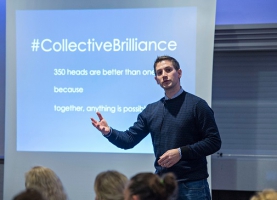Breaking silos has always been an interesting topic.
Some knowledge managers believe it to be necessary for knowledge to flourish, but silos are necessary for many organisations as not all information can or should be accessible to everyone.
Silos are often created by the organisations themselves to protect sensitive information and keep their employees focused on their work and away from irrelevant activities that are happening on other projects that can become distractions. Many software development companies understand this need and have created excellent software to enable silos.
However, a lot of valuable knowledge is lost that way...

Posted by TallyFox on 23 January 2017
Comment

Posted by TallyFox on 23 January 2017
Knowledge managers often say that a considerable challenge in implementing knowledge management is demonstrating how those investments provide value to the organisation. Many knowledge managers have encountered a skeptical executive or two who, after the KM presentation, leans back in the chair and asks: "Show me the ROI".
How can one measure the ROI of an attitude?
At the beginning of the implementation process, knowledge managers often need to demonstrate the value in order to gain full support from senior management as they need to make investment decisions to fund it and they want to be sure the investment will be worthwhile.
Because of this,...

Posted by TallyFox on 20 January 2017
The English Institute of Sport (EIS) formally invested in Knowledge management after the London Games in 2012 with the appointment of Dr Peter Brown as the Head of Performance Knowledge.
The EIS is one of the world’s largest providers of sport science and sports medicine to Great Britain’s Olympic and Paralympic athletes. EIS has recognised the need to facilitate, capture and exploit the knowledge and expertise of their members, and under the leadership of Dr Peter Brown, has invested a lot of time and effort into a functioning knowledge management process.
The key driver behind the EIS’s KM effort is the ability to connect their teams...

Posted by TallyFox on 17 January 2017
Recognising the need for storing information, collaborating and improving their work, law firms and legal departments started building intranets around 1995. Those early intranets served mostly for storing administrative information and static legal content.
Today, progressive legal organisations are investing in KM and are using portals with dynamic content.
What knowledge management does for legal professionals is to help them capture and reuse their collective wisdom, benefit from their prior work and accumulated expertise in order to solve legal and business issues by making it easier for lawyers to find information and colleagues with expertise....




